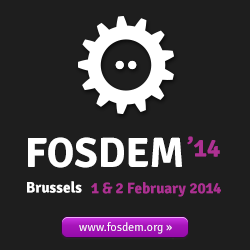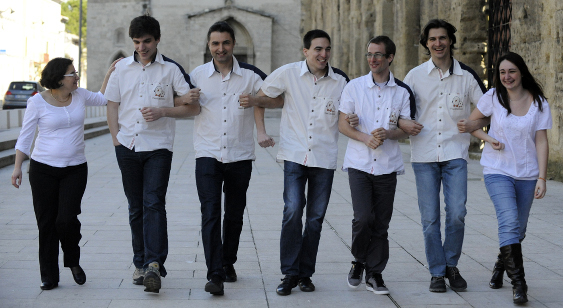The Bootlin team wishes you a Happy New Year for 2013, with success in your professional and personal projects, and in contributing to other people’s lives. We are taking this opportunity to give some news about Bootlin.
In 2012, Bootlin continued to work on multiple development projects. The main difference with 2011 is that the projects were much longer. Here are the most important ones:
- Linux kernel code development, adding and maintaining support for Marvell Armada 370 and Armada XP ARM SoCs in the mainline Linux kernel. Months of engineering work! Our commits appear on git.kernel.org.
- Linux kernel code development and toolchain work on a new i.MX28 computer-on-module from Crystalfontz, adding support for this system to the mainline Linux kernel. See the project page on Kickstarter!
- Build system integration, bootloader and kernel driver development, system update mechanism improvements, and general embedded Linux development work.
- Kernel driver development and upstreaming for AT91 analog to digital converters.
- Boot time optimization and power management audit on a MIPS based point of sales terminal
- Boot time reduction project on a ARM based point-of-sales development kit.
- Embedded Linux system integration, development and support.
Through contract work or through direct contributions, 2012 gave us multiple opportunities to contribute to open-source projects, in particular:
- 195 patches to the Linux kernel, plus the ones which have been accepted by maintainers but haven’t been included by Linus Torvalds yet. See git.kernel.org for details.
- 448 patches to the Buildroot build system. See git.buildroot.net for details.
- 9 patches to the U-boot bootloader.
- 7 patches to the Barebox bootloader. See git.penguntronix.de for details.
By the way, here’s the git command that you can run in the corresponding repositories to count the commits by yourself:
git shortlog --no-merges -sn --author your-domain --since="01/01/2012" --until="12/31/2012"
We gave multiple sessions of our Embedded Linux system development and Linux kernel and driver development courses. We have also completed migrating our training materials from the Open Document Format to LaTeX, and their sources are now available on our public git server, making it much easier to follow changes and contribute to them.
We also created a new Android system development course and delivered multiple sessions of it. It is a four days training course to understand the Android system architecture, how to build and customize an Android system for a given hardware platform, and how to extend the Android platform to take new hardware devices into account.
As in the previous years, we also gave presentations at international conferences:
- IIO, a new subsystem (FOSDEM, Brussels, February 2012)
- Qt for non graphical apps (FOSDEM, Brussels, February 2012)
- Buildroot: a nice, simple and efficient embedded Linux build system (Embedded Linux Conference, San Francisco, February 2012)
- Buildroot: a nice, simple and efficient embedded Linux build system (Libre Software Meeting, Geneva, July 2012)
- Buildroot workshop (Libre Software Meeting, Geneva, July 2012)
- Linux kernel: consolidation in the ARM architecture support (Libre Software Meeting, Geneva, July 2012)
- A look through the Android stack (Libre Software Meeting, Geneva, July 2012)
- Your new ARM SoC Linux support check-list (Embedded Linux Conference Europe, Barcelona, November 2012)
Also attending these conferences, the Bootlin team also recorded and published videos of the talks:
Thanks to their contributions to the mainline Linux kernel on the ARM platform, Gregory Clement and Thomas Petazzoni have also been invited to the ARM minisummit at the Linux kernel summit in San Jose in August. They were involved in decision making for the next evolutions of the Linux kernel on the ARM architecture.
We also organized and participated to two “Buildroot developer days” events, one in Brussels in February after Fosdem, and one in Barcelona in November after ELC Europe.
We also continued to participate to the development of the community of Linaro, an engineering organization working on improving Linux on the ARM platform. Note that this involvement is now over, allowing Michael Opdenacker to get back to more technical projects.
Now, let’s talk about our plans for 2013.
We plan to continue to hire more engineers to meet growing demand for our development and training services. In particular, a new engineer is joining us in March.
We are also organizing several public training sessions in France, which dates are now available:
- Android system development, Toulouse, Apr. 2-5 (French)
- Embedded Linux kernel and driver development, Toulouse, Apr. 8-12 (French)
- Embedded Linux system development, Toulouse, Jun. 10-14 (French)
- Embedded Linux kernel and driver development, Avignon, Jun. 10-14
- Android system development, Toulouse, Jun. 18-21
- Embedded Linux system development, Avignon, Oct. 7-11
We also plan to announce several new training sessions. Being very busy with projects in 2012, we haven’t had time to make progress in the plans we announced one year ago:
- Git training. A two day training session to clearly understand how to use the Git distributed version control system, both for internal projects and for contribution to open-source projects.
- Linux kernel debugging, tracing and performance analysis course. A one to two day session to trace kernel execution, investigate bugs and performance issues.
- Boot time reduction training. A one to two day workshop to learn and master the methodology and techniques to make your embedded Linux systems boot faster.
As we are only in the very early stages of planning and preparing these courses, don’t hesitate to take the opportunity to contact us to let us know your expectations and influence their contents, in case you are interested in such courses.
We will also continue to participate to the key technical conferences. In particular, Bootlin engineers will be present at the Android Builders Summit and the Embedded Linux Conference in San Francisco, and at Embedded Linux Conference Europe in Edinburgh in October. This participation to conferences allows Bootlin engineers to remain up-to-date with the latest developments in the embedded Linux area and to create useful contacts in the community. Do not hesitate to go to such conferences, develop your technical knowledge and to take the opportunity to meet us there!
Last but not least, we will try harder to really write this newsletter every quarter. In 2012, we were so busy with projects that we didn’t manage to release newsletters for Q3 and Q4.
You can follow Bootlin news by reading our blog (31 articles in 2012) and by following our quick news on Twitter.
Again, Happy New Year!
The Bootlin team.




 As usual, our training materials are available under the terms of the
As usual, our training materials are available under the terms of the 
